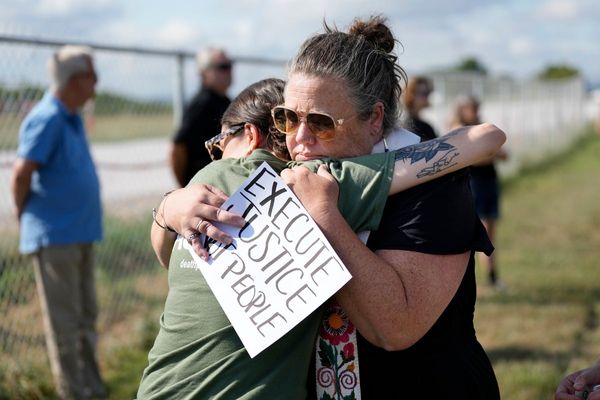
Having made his name with the hugely successful Counting and Cracking – an epic three-hour work spanning multiple generations and featuring a massive set, 16 performers and many more characters – the Sydney playwright S Shakthidharan has downsized in his latest play. The Wrong Gods covers just seven years over 100 minutes, with four actors on an almost bare stage. But do not be deceived: this is an ambitious work with big ideas on its mind. It tilts at nothing less than the history of capitalism and impacts of modernity.
Our setting is riverside in a valley in India, surrounded by a bountiful forest – a kind of prelapsarian paradise. Here we meet Nirmala (Nadie Kammallaweera, the star of Counting and Cracking and its sequel, The Jungle and the Sea), a farmer and the head of her village’s council, and her precocious teen daughter, Isha (Radhika Mudaliyar, another Counting and Cracking alum), an aspiring scientist.
Nirmala, whose ancestral roots in the valley stretch generations, believes in the old, pre-Hinduism gods – and in particular the goddess: the river. Isha does too, though her voracious mind is already questioning these belief systems and questing for greater truths. Isha longs to escape back to school in the city. Nirmala, newly abandoned by her husband, needs her daughter home to help work their patch of land. The two quarrel over their competing values and visions of the world, as mothers and daughters often do.
A greater struggle is afoot: Nirmala is anxiously awaiting the arrival of “big fat American” developers who have greedy eyes on the village, and prays to the goddess to send them packing. Isha prays to the goddess to let her go with them, back to her teacher and educational champion, Miss Devi (Manali Datar). And then, as if teleported from another dimension, Lakshmi (Vaishnavi Suryaprakash) arrives: a middle-class smooth-talker with an offer too good to refuse – and a magic packet of seeds that promises high yields with low labour. Nirmala can prosper; Isha can go to school.
If this smacks of fairytale or myth, it’s by design and clearly telegraphed by the play’s elemental set (its stone surfaces and moss-tipped concentric circles evoking an ancient amphitheatre) and by the dialogue: Isha, it is explained, is the goddess of destruction; Lakshmi is the goddess of wealth. But there may be other clues here too: in Sanskrit, Isha means strength, guardian or protector; Nirmala means virtuous.
The Wrong Gods is doing double duty, working as a fable of capitalism and modernity, and as a primer on a specific chapter of Indian history: the government-sponsored Green Revolution of the 1960s and 70s, and its devastating impacts. Nirmala’s village is a microcosm of a devilish pact in which an estimated 50 million farmers and Indigenous people were displaced by a network of dams that promised water for the cities, at the expense of natural environments and civilisations thousands of years in the making.
At the same time, the Indian government and foreign companies induced farmers to abandon old crops and methods for new high-yield varieties of wheat and corn, and synthetic fertilisers. This also came at a cost, sending millions of farmers into crushing debt cycles that spawned suicide epidemics, and upended delicate ecosystems with far-reaching consequences.
The Wrong Gods was inspired by one of the centres of this modern tragedy: the Narmada Valley, site of the Sardar Sarovar dam network – dubbed “India’s greatest planned environmental disaster”. It was also the birthplace of one of India’s most successful civil resistance movements: Narmada Bachao Andolan.
Shakthidharan spent time in the valley more than a decade ago, and The Wrong Gods offers an imagined origin story for Narmada Bachao Andolan, which was substantially led by women. Perhaps in tribute to this, not only the cast and characters but almost the entire creative team of this production, which Shakthidharan co-directs with Belvoir resident Hannah Goodwin, are women.
Like many contemporary plays of ideas, The Wrong Gods suffers occasionally from speechifying and on-the-nose lines, with scenes interrupted as characters spout exposition. The extent to which audiences tolerate this may depend on how much they know of the real-world issues.
The play is generally successful, however, in bringing a massive, intractable problem down to the human scale, showing the emotions and interpersonal dynamics – and primal survival instincts – behind this epic tragedy.
The performances are great and special credit goes to Kammallaweera and Mudaliyar, who swiftly and surely bring the mother and daughter to endearing life and make us believe the relationship on to which the play’s big ideas are scaffolded. Goodwin and Shakthidharan keep the drama dynamic and engaging, and pare back aesthetics and action so as to not overwhelm the text.
The result is an absorbing drama – though fans of Counting and Cracking may wish Shakthidharan lent a little less on neat parable and a little more into the human mess.
The Wrong Gods runs until 31 May at Belvoir St Theatre in Sydney and from 6 June to 12 July at Melbourne Theatre Company as part of the Rising festival







